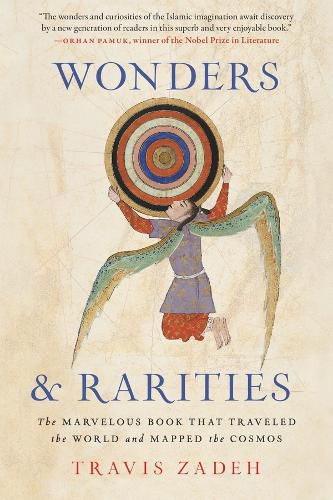Readings Newsletter
Become a Readings Member to make your shopping experience even easier.
Sign in or sign up for free!
You’re not far away from qualifying for FREE standard shipping within Australia
You’ve qualified for FREE standard shipping within Australia
The cart is loading…






"Like al-Qazwini himself, Travis Zadeh has written a deliciously baggy tome, full of delights and diversions in its tour of the cosmic horizons. This is a book to get lost in, whether one wants to or not." -Nile Green, Los Angeles Review of Books
"As Zadeh concludes, reformers and modernists have closed the rich and varied archive revealed in Wonders and Rarities...In this beautifully written and engaging text, Zadeh takes his readers back to the world of surprise and enchantment that preceded this closure."-Malise Ruthven, Financial Times
"This book about a book, like the book it describes, is a rare and marvelous thing." -Justin Marozzi, The Spectator
During the thirteenth century, the Persian naturalist and judge Zakariyyā' Qazwini authored what became one of the most influential works of natural history in the world: Wonders and Rarities. Exploring the dazzling movements of the stars above, the strange minutiae of the minerals beneath the earth, and everything in between, Qazwini offered a captivating account of the cosmos. Wonders and Rarities inspired generations as it traveled through madrasas and courts, unveiling the magical powers of nature. But Qazwini's compendium eventually came to stand as a strange, if beautiful, emblem of medieval ignorance.
Restoring Qazwini to his place as a herald of the rare and astonishing, Travis Zadeh dramatically revises the place of wonder in the history of Islamic philosophy, science, and literature. Wonder provided an enduring way to conceive of the world-at once constituting an affective reaction, an aesthetic stance, a performance of piety, and a cognitive state. Yet through the course of colonial modernity, Qazwini's universe of marvels helped advance the notion that Muslims lived in a timeless world of superstition and enchantment, unaware of the western hemisphere or the earth's rotation around the sun.
Recovering Qazwini's ideas and his reception, Zadeh invites us into a forgotten world of thought, where wonder mastered the senses through the power of reason and the pleasure of contemplation.
$9.00 standard shipping within Australia
FREE standard shipping within Australia for orders over $100.00
Express & International shipping calculated at checkout
"Like al-Qazwini himself, Travis Zadeh has written a deliciously baggy tome, full of delights and diversions in its tour of the cosmic horizons. This is a book to get lost in, whether one wants to or not." -Nile Green, Los Angeles Review of Books
"As Zadeh concludes, reformers and modernists have closed the rich and varied archive revealed in Wonders and Rarities...In this beautifully written and engaging text, Zadeh takes his readers back to the world of surprise and enchantment that preceded this closure."-Malise Ruthven, Financial Times
"This book about a book, like the book it describes, is a rare and marvelous thing." -Justin Marozzi, The Spectator
During the thirteenth century, the Persian naturalist and judge Zakariyyā' Qazwini authored what became one of the most influential works of natural history in the world: Wonders and Rarities. Exploring the dazzling movements of the stars above, the strange minutiae of the minerals beneath the earth, and everything in between, Qazwini offered a captivating account of the cosmos. Wonders and Rarities inspired generations as it traveled through madrasas and courts, unveiling the magical powers of nature. But Qazwini's compendium eventually came to stand as a strange, if beautiful, emblem of medieval ignorance.
Restoring Qazwini to his place as a herald of the rare and astonishing, Travis Zadeh dramatically revises the place of wonder in the history of Islamic philosophy, science, and literature. Wonder provided an enduring way to conceive of the world-at once constituting an affective reaction, an aesthetic stance, a performance of piety, and a cognitive state. Yet through the course of colonial modernity, Qazwini's universe of marvels helped advance the notion that Muslims lived in a timeless world of superstition and enchantment, unaware of the western hemisphere or the earth's rotation around the sun.
Recovering Qazwini's ideas and his reception, Zadeh invites us into a forgotten world of thought, where wonder mastered the senses through the power of reason and the pleasure of contemplation.